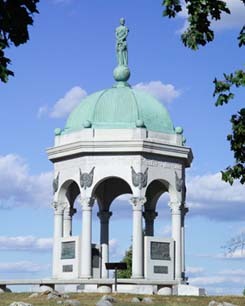
- Capital City:
- Annapolis
- Nickname:
- Old Line State / Free State
- Motto:
- Fatti Maschii Parole Femine(Manly deeds, womanly words)
- Statehood:
- April 28, 1788 (7th)
- Origin of State's Name:
- Named to honor Henrietta Maria, wife of England's King Charles I.
- Largest Cities:
- Baltimore, Columbia, Silver Spring, Dundalk, Wheaton-Glenmont, Ellicott City
- Border States:
- Delaware, Pennsylvania, Virginia, West Virginia
- Land Area:
- 9,775 sq. mi., 42nd largest
- State Bird:
- Baltimore Oriole
- State Flower:
- Black-Eyed Susan (rudbeckia hirta)
- State Tree:
- White Oak
- State Song:
- Maryland, My Maryland
One of the original 13 states to join the Union (in 1788), Maryland is in the middle of the Eastern Seaboard. It's believed that Lord Baltimore, who received a charter for the land in 1632, named the state after Queen Henrietta Maria, wife of King Charles I. The Mason and Dixon line was drawn in the 1760s to settle a dispute between the Penn and Calvert families. In addition to marking the boundary between Pennsylvania and Maryland, it is the traditional boundary between the North and the South. Maryland is known as the "Free State"; its flower is the black-eyed susan; and its capital is Annapolis, home of the U.S. Naval Academy.
Bassmaster Fishing Tournament, Smallwood State Park
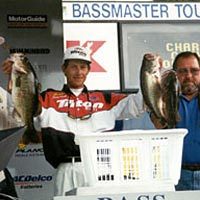
Originally stocked in 1854 with 30 bass brought by train from Ohio, the Potomac River today ranks as one of America's premier largemouth bass fisheries and is the site of numerous amateur and professional tournaments each year, including the Bassmaster. For the last 10 out of 11 years, the Bassmaster Top 150 tournament has been hosted on the stretch of the Potomac that runs through Smallwood State Park in Charles County, Maryland. It attracts fisherman in both pro and amateur divisions from throughout the United States, from Canada, even internationally. Bass fishing can be found year-round on the Potomac in Charles County. As far back as 1608, Captain John Smith marveled at the huge size and vast numbers of striped bass in the area; in fact, stripers (locally known as Rockfish) are Maryland's state fish.
The Bassmaster Top 150 is famous in fishing circles because the hydrilla growth in the river changes the conditions for bass fishing every year. Hydrilla, a submerged aquatic plant, provides the majority of the cover for the river's bass population, and its fluctuating growth doesn't seem to affect the catches, which remain high. Winning stringers regularly top 50 pounds. Fishing the tidal waters (the Chesapeake Bay is nearby) presents additional challenges to fishermen, who need to time the tides with tournament fishing hours as part of their angling strategies.
The project is documented with a printout of Bassmaster web pages, a listing of the standings for the 3-day tournament, a list of 1999 entrants in the tourney, coverage in bass-fishing periodicals, several promotional brochures, a videotape of the 1997 Bassmasters tournament, one color snapshot, and a fishing cap.
The Carroll County Ghost Walk
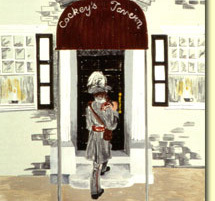
This annual event is held in Westminster by the Carroll County Public Library. Participants are introduced to ghost stories from local folklore at a narrated slide show held at the Westminster Branch Library. Then the group is guided through a walking tour that traces the paths of the local legends, brought to life by skilled storytellers. Held since the early 1980's, the ghost walk was inspired by the book Ghosts and Legends of Carroll County, Maryland, compiled by Jesse Glass, Jr. and published by the Library in 1982. The project includes a copy of that book,17 slides, background text, a copy of the script for the ghost walk, promotional and supplemental materials, and audio tapes of two of the stories, The Story of Cockey's Tavern and The Legend of God's Well.
Chestertown Tea Party Festival
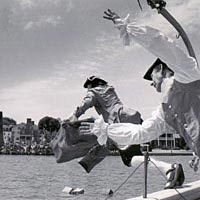
As a reaction to the British closing the port of Boston after the Boston Tea Party, the citizens of Chestertown wrote a set of resolves that prohibited the buying, selling, or drinking of tea, and, in an act of colonial defiance, held their own tea party on the Chester River in Chestertown five months later in May 1774. The festival commemorates the historic event with a re-enactment of the "tea party," parade, colonial music and dance, fife and drum performances, puppet shows, colonial crafts demonstrations and sales, military drills, and a walking tour of the historic district. This historic town was established in 1706. Other activities offered are boat rides, music, Maryland Eastern shore food, a ten-mile distance run (the oldest in the U.S.), and children's games and storytelling.
Smith Island
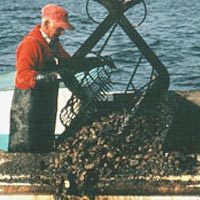
Maryland's only inhabited offshore island is home to 350 men, women, and children who are descended from the original settlers who arrived in 1659. The original English and Welsh settlers inhabit the three villages of Smith Island, possibly Maryland's most isolated and intact enclave of traditional culture. Families are said to be able to trace their genealogy back 12 generations. Islanders speak a distinctive dialect that they call a "backward language" - they employ certain turns of phrase that only an islander would understand correctly. Once an island of farmers, today's inhabitants make a living crabbing and oystering in the Chesapeake Bay. It is a hard occupation, sometimes involving 12-hour days. No local government or police maintain order on the island, but each community has its own Methodist church where local decisions are made, thus providing political as well as religious cohesion. A 20-minute videotape, "Land and Water, People and Time," and 23 color slides show the islanders at work and at worship. The text of 12 interviews with the inhabitants is included, and a five-page essay and cookbook provide a colorful evocation of life on the island.
 Print
Print Email
Email







